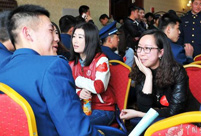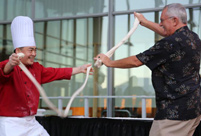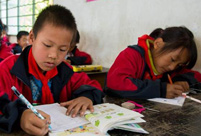 'Model husband' shatters image of love
'Model husband' shatters image of love
 Can animals smile? Or put on a happy face
Can animals smile? Or put on a happy face
 Geng Xuan crowned at 9th China Super Model Contest
Geng Xuan crowned at 9th China Super Model Contest
 Top 10 billionaires in the liquor industry
Top 10 billionaires in the liquor industry
 Backstage at China Fashion Week
Backstage at China Fashion Week
 Ballerinas anywhere but onstage
Ballerinas anywhere but onstage
 Top 10 safest airlines in the world
Top 10 safest airlines in the world
 Posters of 33rd HK Film Awards unveiled
Posters of 33rd HK Film Awards unveiled
 Top 10 most popular instant messaging apps in the world
Top 10 most popular instant messaging apps in the world
 Inspiring shadow images of Chinese army
Inspiring shadow images of Chinese army
According to a Pew poll last November, 52 percent of Americans believe the US "should mind its own business internationally". Some argue that the US is making strategic adjustments to its diplomacy, as manifested in the way it has dealt with issues like Syria, Afghanistan and Ukraine. In this article, experts from China and abroad offer their opinions regarding such perceived adjustments and the direction of future US foreign policy.
Joseph Nye, political scientist at Harvard University, former US Assistance Secretary of Defense
Yuan Peng, Vice President of China Institute of Contemporary International Relations
Leonardo Valente, Professor of Internacional Relations at Universidade Federal do Rio de Janeiro
Ding Gang, senior reporter of People's Daily
IV: Post-hegemonic era
"The preeminent power does not have to patrol every boundary and project its strength everywhere; China is starting to deepen its reform and opening up, but we should not think we are the only one reforming; Emerging market countries are actively engaging in the establishment of a new world order; Emerging market countries taking part in the adjustment and reform of the international order does not equal destroying the existing order."
Joseph Nye: The preeminent power does not have to patrol every boundary and project its strength everywhere. As a leader in research and development, higher education, and entrepreneurial activity, the US, unlike ancient Rome, is not in absolute decline. We do not live in a "post-American world," but we also no longer live in the "American era" of the late-20th century. In the decades ahead, the US will be "first" but not "sole." That is because the power resources of many others - both states and non-state actors - are growing, and because, on an increasing number of issues, obtaining America's preferred outcomes will require exercising power with others as much as over others. The capacity of US leaders to maintain alliances and create networks will be an important dimension of America's hard and soft power. The problem for US power in the 21st century is not just China, but the "rise of the rest."
Yuan Peng: If we look around the world, we will see that almost every major power is going through structural changes domestically, exploring strategic space internationally, and seeking to construct new international orders that are in the interests of its own long-term development. China is starting to deepen its reform and opening up, but we should not think we are the only one reforming. The initial stage of reform and opening up was designed to introduce and integrate China to the established international system, and has achieved great success. Now, it's more of a matter of co-repairing and co-constructing a more reasonable international system together with other countries. China has to do more in this process.
Leonardo Valente: Emerging market countries are actively engaging in the establishment of a new world order. This is irreversible. The challenge we face today is about clearer and more accurate positioning – finding the right place for the emerging market countries, the US, Europe, and other powers.
Ding Gang: In this post-hegemonic era, building a more just and reasonable international order will require a protracted period of time. Emerging market countries taking part in the adjustment and reform of the international order does not equal destroying the existing order. A lot of work has to be built up on the original foundations. Emerging market countries will not only have a better say under this new framework, but also assume greater levels of responsibility. These countries should also learn to strengthen coordination among themselves. New to the experience of decision-making, they need to act together in order to secure their hard-won rights and status.
The article is edited and translated from《美国外交——战略收缩还是以退为进?》, source: People's Daily.
Read more:
Where is US diplomacy going? Part I: Strategic retreat?
Where is US diplomacy going? Part II: Smart power
Where is US diplomacy going? Part III: Strategic expansion?
 Wonderful moment of China's airborne forces
Wonderful moment of China's airborne forces Bai Baihe shoots for fashion magazine
Bai Baihe shoots for fashion magazine Red terraced fields in Dongchuan of Yunnan
Red terraced fields in Dongchuan of Yunnan Jiaju Tibetan Village
Jiaju Tibetan Village Spring dating
Spring dating Confucius institute at UC Davis
Confucius institute at UC Davis Little painted faces at temple fair
Little painted faces at temple fair Top 10 safest airlines in the world
Top 10 safest airlines in the world Foreign students at China-Myanmar border
Foreign students at China-Myanmar border The backstage of the Fashion Week
The backstage of the Fashion Week College students in Han costumes
College students in Han costumes Postgraduate works as waitress
Postgraduate works as waitress Life in a Lahu village in Yunnan
Life in a Lahu village in Yunnan An orphan’s wedding
An orphan’s wedding Hollywood documentary brings Diaoyu Islands truth to new audience
Hollywood documentary brings Diaoyu Islands truth to new audienceDay|Week|Month